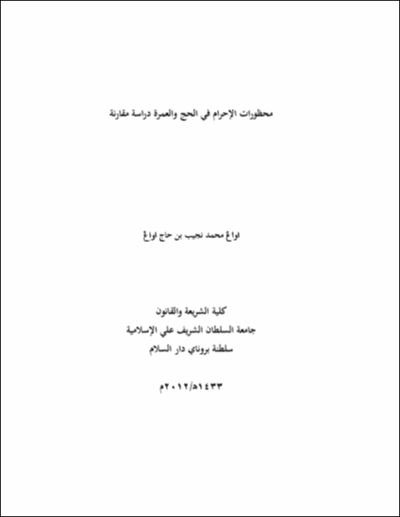محظورات الإحرام في الحج والعمرة دراسة مقارنة

Date
2012-04-27Author
Awang Mohammed Najib bin Awang
Abstract
Performing pilgrimage hajj to Mecca is one of the fifth pillar of Islam, as the Prophet
Muhammad peace be upon him said: ((The structure of Islam is built on five pillars:
testification of 'la Ilaha Illa Allah' (none has the right to be worshipped but Allah), that
Muhammad (Sallallaahu 'alaihi wasallam) is his Messenger, the establishment of Solat, the
payment of Zakat, fasting during the month of Ramadhan, and the performance of pilgrimage
to the House of Allah)) narrated by Muslim. The experts in Islamic Jurisprudence (fuqaha)
have agreed that it is obligatory (Wajib) to Muslim to perform Pilgrimage to Mecca to those
having capability to do so. Similarly, performance of umrah is highlyrecommended/
meritorious (Sunnah Muakkadah) in the opinion of the Hanafi and Maliki
Madzhab respectively. While, Madzhab Shafi'i and Hanbali states that, it is only compulsory
once in a lifetime as the hajj. It has yet been made known to public that the things forbidden
during ihram, act as a reminder and observance to the prospective hajj pilgrims so they can
attain an accepted-hajj (Mabrur) and prevent them from committing forbidden things, as it is
better than to pay ransom (fidyah). The aim of this research is to provide information and
reminders to the prospective hajj pilgrims, with regards to the forbidden things in the state of
Ihram while performing hajj and umrah, also to discuss the comparative studies, consensus
and conflicts in justification made by the experts in Islamic Jurisprudence (fuqaha).
Methodology used in this research are through books, books of turath, hadith and tafsir,
obtained from Sultan Sharif Ali Islamic University (UNISSA) Library, Brunei Darussalam
University (UBD) Library, The Ismail bin Omar Abdul Aziz Jame' Asr Hassanil Bolkiah
Library and the Darul Ifta, States’ Mufti Library. As well as, downloaded books and/or
materials from the websites, associated with this research. This research is divided into three
chapters. The first chapter explains the concept of hajj and umrah, the law, the evidence ( دليل
شرعي ), and the wisdom of hajj and umrah and their respective differences. The second chapter
explains the rules and obligations of hajj and umrah and the opinions of the experts in Islamic
Jurisprudence (fuqaha). The third chapter is divided into two parts, the first part says about the
things that are forbidden during ihram in hajj and umrah, while the second part explains on the
duties to those who committed the forbidden things while in the state of ihram. The results of
the study is the consensus among the experts in Islamic Jurisprudence (fuqaha) regarding the
forbidden things during ihram in hajj and umrah, among others are: 1)men wearing any kinds
of sewn clothes or shoes or head-covering/head-gear without substantial reason, 2)men
covering their heads and women covering their faces, 3)trimming hairs, 4)clipping nails,
5)wearing perfume, 6)hunting animals, 7)cutting down of trees and plants in the Sanctuary,
8)sexual relations or indulge in obscenity. Differences in some of the forbidden things in the
state of Ihram would be deeply discussed in this research.
Collections
Alternative Title
THINGS THAT ARE FORBIDDEN IN THE STATE OF IHRAM IN PILGRIMAGE HAJJ AND UMRAH: A COMPARATIVE STUDY AMONG MADZHAB

